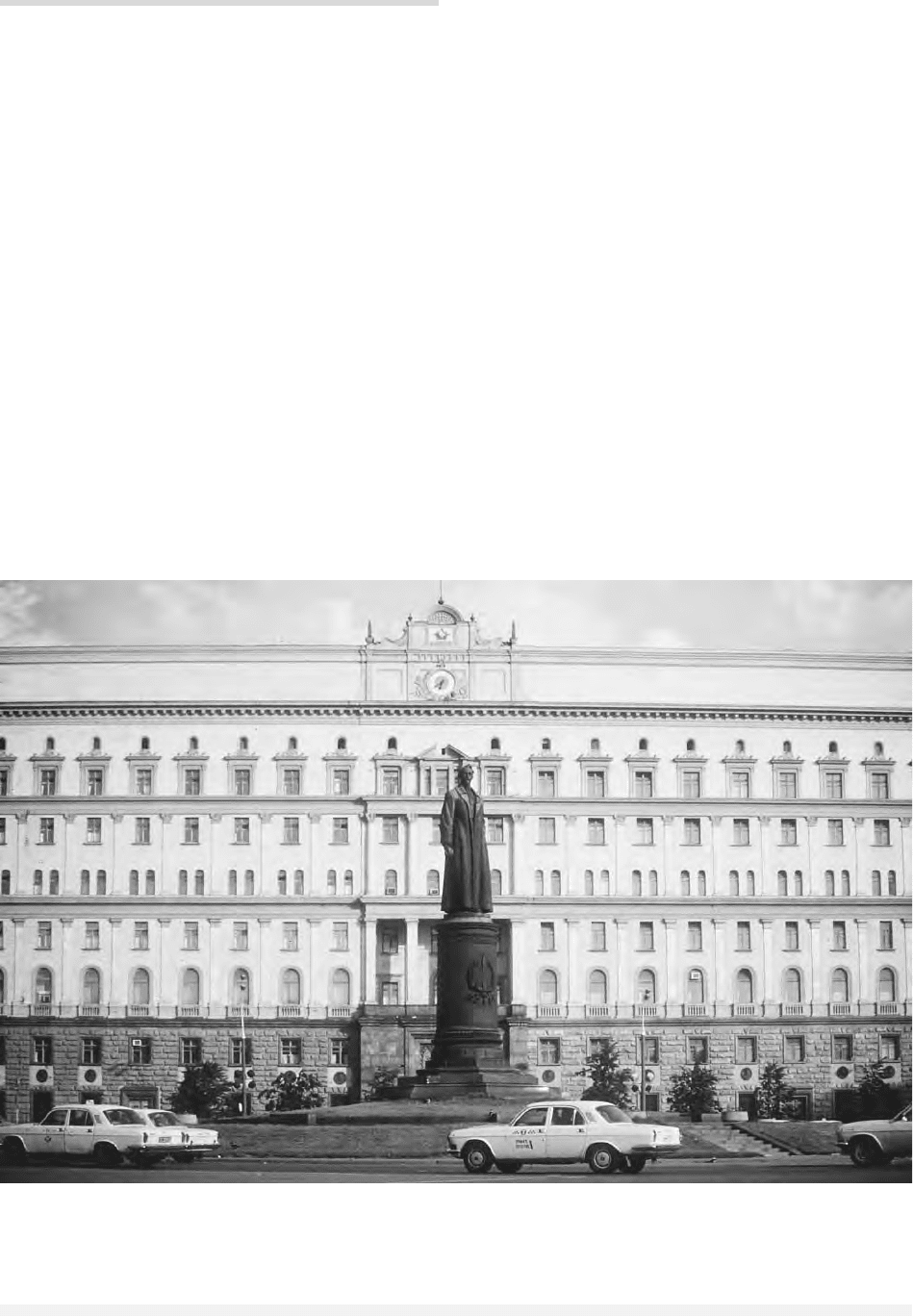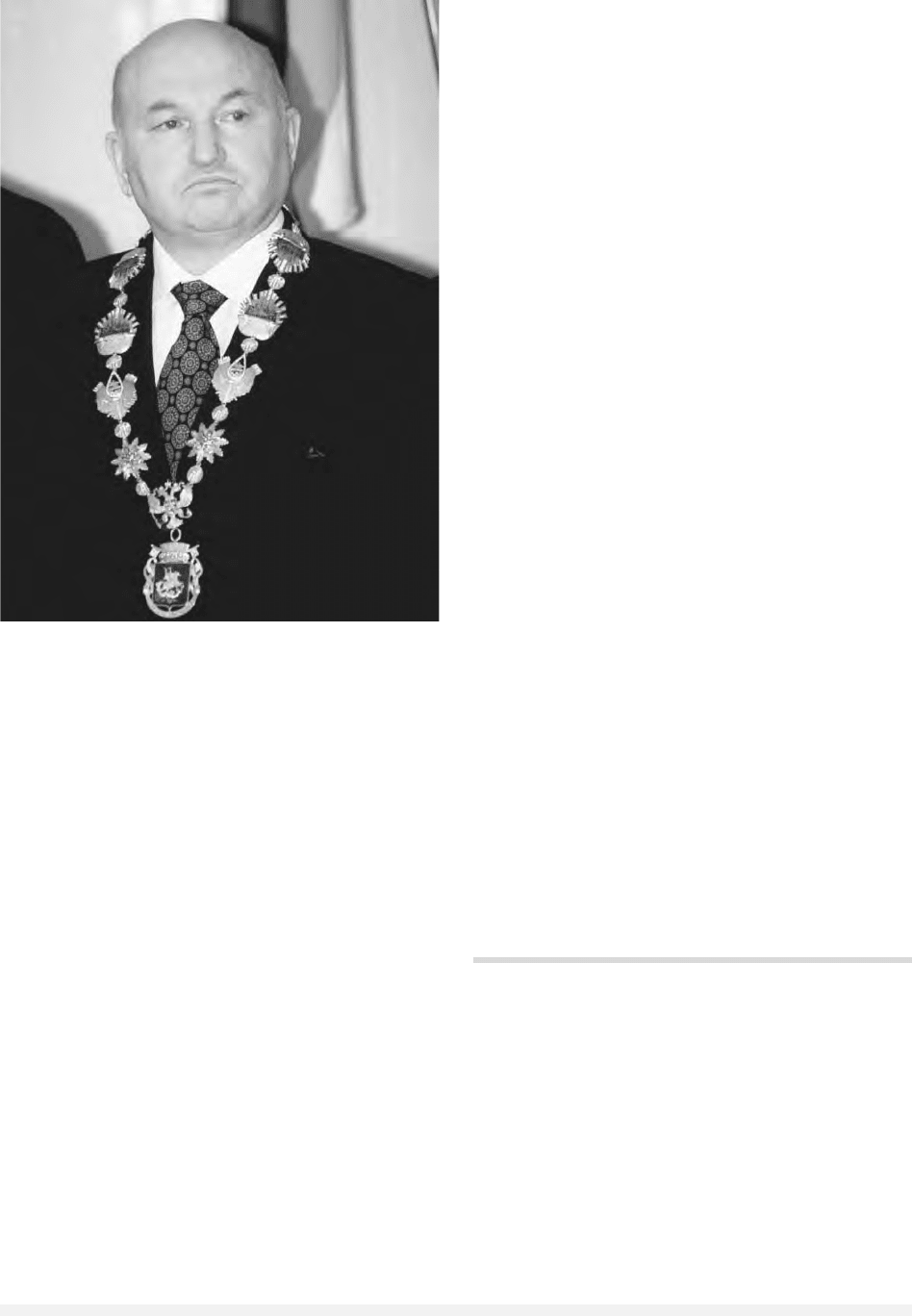Encyclopedia of Russian History
Подождите немного. Документ загружается.


cability of canonized belief from the challenges
launched by science, and even wrote a hymn lam-
pooning the theologians who stood in the way of
scientific progress. While attacking theological
zealots, he never deviated from a candid respect for
religion—and he never alienated himself from the
church. Small wonder, then, that two archiman-
drites and a long line of priests officiated at his bur-
ial rites. After his death, the church recognized him
as one of Russia’s premier citizens, and many
learned theologians took an active part in building
the symbolism of the Lomonosov legend.
In his time, and shortly after his death, Lomono-
sov was known almost exclusively as a poet; only
isolated contemporaries grasped the intellectual and
social significance of his achievements in science. A
good part of his main scientific manuscripts lan-
guished in the archives of the St. Petersburg Acad-
emy until the beginning of the twentieth century.
Lomonosov was known for having made little ef-
fort to communicate with Russian scientists in and
outside the Academy. On his death, a commemo-
rative session was attended by eight members of
the Academy, who heard a short encomium deliv-
ered by Nicholas Gabriel de Clerc, a French doctor
of medicine, writer on Russian history, newly
elected honorary member of the Academy, and per-
sonal physician of Kirill Razumovsky, president of
the Academy. While de Clerc praised Lomonosov
effusively, he barely mentioned his work in science.
See also: ACADEMY OF ARTS; ACADEMY OF SCIENCES; ED-
UCATION; ENLIGHTENMENT, IMPACT OF; SLAVIC-
GREEK-LATIN ACADEMY
BIBLIOGRAPHY
Leicester, Henry M. (1976). Lomonosov and the Corpuscu-
lar Theory. Cambridge, MA: Harvard University
Press.
Menshutkin, B. N. (1952). Russia’s Lomonosov, Chemist,
Courtier, Physicist, Poet, tr. I. E. Thal and E. J. Web-
ster, Princeton, NJ.: Princeton University Press.
Pavlova, G. E., and Fedorov, A. S. (1984). Mikhail Vasil’e-
vich Lomonasov: His Life and Work, Moscow: Mir.
A
LEXANDER
V
UCINICH
LORIS-MELIKOV, MIKHAIL TARIELOVICH
(1825–1888), Russian general and minister, head
of Supreme Executive Commission in 1880–1881.
Mikhail Loris-Melikov was born in Tiflis into
a noble family. He studied at the Lazarev Institute
of Oriental Languages in Moscow and at the mili-
tary school in St. Petersburg (1839–1843). In 1843
he started his military service as a minor officer in
a guard hussar regiment. In 1847 he asked to be
transferred to the Caucasus, where he took part in
the war with highlanders in Chechnya and Dages-
tan. He later fought in the Crimean War from 1853
to 1856. From 1855 to 1875 he served as the su-
perintendent of the different districts beyond the
Caucasus and proved a gifted administrator. In
1875 Loris-Melikov was promoted to cavalry gen-
eral. From 1876 he served as the commander of the
Separate Caucasus Corps. During the war with
Turkey of 1877–1878 Loris-Melikov commanded
Russian armies beyond the Caucasus, and distin-
guished himself in the sieges of Ardagan and Kars.
In 1878 he was awarded the title of a count.
In April of 1879, after Alexander Soloviev’s as-
sault on emperor Alexander II, Loris–Melikov was
appointed temporary governor–general of Kharkov.
He tried to gain the support of the liberal commu-
nity and was the only one of the six governor–
generals with emergency powers who did not
approve a single death penalty. A week after the ex-
plosion of February 5, 1880, in the Winter Palace,
he was appointed head of the Supreme Executive
Commission and assumed almost dictator-like
power. He continued his policy of cooperation with
liberals, seeing it as a way of restoring order in the
country. At the same time, he was strict in his tac-
tics of dealing with revolutionaries. In the under-
ground press, these tactics were called “the wolf’s
jaws and the fox’s tail.” In April 1880 Loris-Me-
likov presented to Alexander II a report containing
a program of reforms, including a tax reform, a lo-
cal governing reform, a passport system reform,
and others. The project encouraged the inclusion of
elected representatives of the nobility, of zemstvos,
and of city government institutions in the discus-
sions of the drafts of some State orders.
In August 1880 the Supreme Executive Com-
mission was dismissed at the order of Loris-Melikov,
who believed that the commission had done its job.
At the same time, the Ministry of Interior and the
Political Police were reinstated. The third division
of the Emperor’s personal chancellery (the secret
police) was dismissed, and its functions were given
to the Department of State Police of the Ministry
of the Interior. Loris-Melikov was appointed min-
ister of the interior. In September 1880, at the ini-
tiative of Loris-Melikov, senators’ inspections were
LORIS-MELIKOV, MIKHAIL TARIELOVICH
873
ENCYCLOPEDIA OF RUSSIAN HISTORY

undertaken in various regions of Russia. The re-
sults were to be taken into consideration during the
preparation of reforms. In January 1880 Loris-
Melikov presented a report to the emperor in which
he suggested the institution of committees for an-
alyzing and implementing the results of the sena-
tors’ inspections. The committees were to consist
of State officials and elected representatives of zem-
stvos and city governments. The project later be-
came known under the inaccurate name of
“Loris-Melikov’s Constitution.” On the morning of
March 13, 1881, Alexander II signed the report pre-
sented by Loris-Melikov and called for a meeting of
the Council of Ministers to discuss the document.
The same day the emperor was killed by the mem-
bers of People’s Will.
At the meeting of the Council of Ministers on
March 20, 1881, Loris-Melikov’s project was
harshly criticized by Konstantin Pobedonostsev and
other conservators, who saw this document as a
first step toward the creation of a constitution. The
new emperor, Alexander III, accepted the conserva-
tors’ position, and on May 11 he issued the man-
ifesto of the “unquestionability of autocracy,”
which meant the end of the reformist policy. The
next day, Loris-Melikov and two other reformist
ministers, Alexander Abaza and Dmitry Miliutin,
resigned, provoking the first ministry crisis in
Russian history.
Having resigned, but remaining a member of
the State Council, Loris-Melikov lived mainly
abroad in Germany and France. He died in Nice.
See also: ALEXANDER II; AUTOCRACY; LOCAL GOVERN-
MENT AND ADMINISTRATION; ZEMSTVO
BIBLIOGRAPHY
Zaionchkovskii, Petr Andreevich. (1976). The Russian Au-
tocracy under Alexander III. Gulf Breeze, FL: Academic
International Press.
Zaionchkovskii, Petr Andreevich. (1979). The Russian Au-
tocracy in Crisis, 1878-1882. Gulf Breeze, FL: Acade-
mic International Press.
O
LEG
B
UDNITSKII
LOTMAN, YURI MIKHAILOVICH
(1922–1993), scholar, founder of the Tartu-
Moscow Semiotic School.
Yuri Lotman was a widely cited scholar of So-
viet literary semiotics and structuralism. He estab-
lished the Tartu-Moscow Semiotic School at Tartu
University in Estonia. This school is famous for its
Works on Sign Systems (published in Russian as Trudy
po znakovym systemam). Unusually prolific, he pub-
lished some eight hundred works on a high schol-
arly level. He is sometimes compared to Mikhail
Bakhtin, another well-known Russian scholar.
Lotman began teaching at the University of
Tartu in 1954. Starting as a historian of Russian
literature, Lotman focused on the work of
Radishchev, Karamzin, and Vyazemsky and the
writers linked to the Decembrist movement. His
later books covered all major literary works, from
the Lay of Igor’s Campaign to the classic nineteenth-
century authors such as Pushkin and Gogol, to Bul-
gakov, Pasternak, and Brodsky. From traditional
philology Lotman shifted in the early sixties to cul-
tural semiotics. His first key publication of that
time, Lectures on Structural Poetics (1964), intro-
duced the abovementioned series Trudy po znakovym
sistemam, which was one of the main initiatives of
the Tartu-Moscow school.
Lotman’s theory of literature rests upon two
closely related sets of fundamental concepts—those
of semiotics and structuralism. Semiotics is the sci-
ence of signs and sign systems, which studies the
basic characteristics of all signs and their combi-
nations: the words and word combinations of nat-
ural and artificial languages, the metaphors of
poetic language, and chemical and mathematical
symbols. It also treats systems of signs such as
those of artificial logical and machine languages,
the languages of various poetic schools, codes, an-
imal communication systems, and so on. Each sign
contains: a) the signifying material (perceived by
the sense organs), and b) the signified aspect (mean-
ing). For words of natural (ordinary) language,
pronunciation or writing is the signifying aspect
while content is the signified aspect. The signs of
one system (for example, the words of a language)
can be the signifying aspect for complex signs of
another system (such as that of poetic language)
superimposed on them.
Lotman defined structuralism as “the idea of a
system: a complete, self-regulating entity that
adapts to new conditions by transforming its fea-
tures while retaining its systematic structure.” He
argued that any chosen object of investigation must
be viewed as an interrelated, interdependent system
composed of units and rules for their possible com-
binations. He defined culture itself as “the whole of
uninherited information and the ways of its orga-
nization and storage.” From the point of view of
LOTMAN, YURI MIKHAILOVICH
874
ENCYCLOPEDIA OF RUSSIAN HISTORY

semiotics, anything linked with meaning in fact
belongs to culture. Since natural language is the
central operator of culture, Lotman and the Tartu-
Moscow school deemed natural language to be a
primary modeling system containing a general pic-
ture of the world. Language was the most devel-
oped, universal means of communication—the
“system of systems.” Lotman took keen interest in
the way philosophical ideas, world views, and so-
cial values of a given period are enacted in its lit-
erature (via language). For Lotman, a period’s
literary and ideological consciousness and the aes-
thetics of its trends and currents have a systemic
quality. These categories are not a hodgepodge of
convictions about the world and literature, but a
hierarchic group of cognitive, ethical, and aesthetic
values.
Critics might object to perceived “scientific op-
timism,” reductionism, and polemics of the Tartu-
Moscow School. The ideological pressures within
the USSR with which the school coped probably
discouraged internal debates and explicit criticism
of its own views.
See also: BAKHTIN, MIKHAIL MIKHAILOVICH; EDUCATION;
ESTONIA AND ESTONIANS
BIBLIOGRAPHY
Lotman, Iu. M.; Ginzburg, Lidiia; et al. (1985). The Semi-
otics of Russian Cultural History: Essays. Ithaca, NY:
Cornell University Press.
Lotman, Iu. M. (2001). Universe of the Mind: A Semiotic
Theory of Culture (The Second World), tr. Ann Shuk-
man. Bloomington: Indiana University Press.
Staton, Shirley F. (1987). Literary Theories in Praxis.
Philadelphia: University of Pennsylvania Press.
J
OHANNA
G
RANVILLE
LOVERS OF WISDOM, THE
The Lovers of Wisdom (Liubomudry), writers based
in Moscow during the 1820s, were strongly influ-
enced by Romanticism and set out to explore the
philosophical, religious, aesthetic and cultural im-
plications of German Idealist philosophy. The So-
ciety for the Love of Wisdom met secretly in the
apartment of its president, Vladimir Odoyevsky
(ca. 1803–1869) from 1823 to 1825. While the So-
ciety formally disbanded following the Decembrist
uprising, its members’ works continued to display
unity of interest and purpose through the late
1820s. The group’s core consisted of Odoyevsky,
Dmitry Venevitinov (1805–1827), Ivan Kireyevsky
(1806–1856), Alexander Koshelev (1806–1883),
and Nikolai Rozhalin (1805–1834). But the num-
ber of people generally considered Lovers of Wis-
dom is much broader, including Alexei Khomyakov
(1804–1860), Stepan Shevyrev (1806–1864),
Vladimir Titov (1807–1891), Dmitry Struisky
(1806–1856), Nikolai Melgunov (1804–1867), and
Mikhail Pogodin (1800–1875).
In secondary literature, the Lovers of Wisdom
have long been overshadowed by the Decembrists.
While the Decembrists pursued political and mili-
tary careers in St. Petersburg and allegedly con-
spired to force political reform, the Lovers of
Wisdom bided their time at comfortably unde-
manding jobs at the Moscow Archive of the
Ministry of Foreign Affairs. They indulged in spec-
ulation on the most abstract issues, with a bent to-
ward mysticism. Even their choice of name, “Lovers
of Wisdom” as opposed to “philosophers”, or
philosophes, is thought to have marked their oppo-
sition to the progressive tradition of the radical En-
lightenment.
Yet the Lovers of Wisdom thought of themselves
as enlighteners in the broader sense. They aimed to
reinvigorate Russian high culture by attacking the
moral corruption of the nobility and promoting
creativity and the pursuit of knowledge. They con-
trasted the superstition and petty-mindedness of
the nobility to the moral purity of the “lover of
wisdom,” who often appeared in their satires and
oriental tales in the guise of a magus, dervish, brah-
min, Greek philosopher, or sculptor, or a misun-
derstood Russian writer. Whether in short stories,
metaphysical poetry, or quasi-philosophical prose
works, Odoyevsky, Venevitinov, Khomyakov and
Shevyrev emphasized the great spiritual and even
religious importance of the young, creative indi-
vidual, or genius. The special status of such indi-
viduals was only highlighted by their apparent
moral fragility and vulnerability in a hostile envi-
ronment.
The group was heavily indebted to Romanti-
cism and to German Idealist philosophy. Admittedly,
Friedrich Wilhelm Joseph Schelling’s philosophy
seems to have appealed in part because it was dif-
ficult to understand. As Koyré (1929) remarked,
their Romanticism was characterized by a “slightly
puerile desire to feel ‘isolated from the crowd,’ the
desire for the esoteric, which is complemented by
the possession of a secret, even if that secret con-
sists only in the fact that one possesses one.”
(p. 37). But their works also display a genuine
LOVERS OF WISDOM, THE
875
ENCYCLOPEDIA OF RUSSIAN HISTORY

commitment to principles such as the fundamen-
tal unity of matter and ideas, and the notion that
these achieve higher synthesis in the absolute, the
spirit that guides the world. To them, creating a
work of art, or striving for any kind of knowledge,
brought the individual into contact with the ab-
solute, lending the artist or intellectual special re-
ligious status.
Such views did not accord with Orthodox
Christianity. The political authorities did not wel-
come them either. Yet the Lovers of Wisdom found
ways of promoting their views in poetry and prose
they published in journals and almanacs, especially
in Mnemozina (1824–1825), edited by Odoyevsky
with the Decembrist Wilgelm Kyukhelbeker, and
Moskovsky vestnik (1827–1830), edited by Pogodin.
They also published translations from leading
voices of Romanticism such as Goethe, Byron, Tieck
and Wackenroder.
The closure of Moskovsky vestnik in 1830
marked the end of the Lovers of Wisdom as a
group. But the death of Venevitinov, often consid-
ered their most talented member, in 1827, had al-
ready dealt them a blow, as did the departure of
many key members from Moscow in the late
1820s. In the early 1830s, the group’s members
developed in new directions. Some of them, such
as Kireyevsky and Khomyakov, eventually became
leaders of the Slavophile movement, arguably the
most coherent and original strain in nineteenth-
century Russian thought.
See also: DECEMBRIST MOVEMENT AND REBELLION;
KHOMYAKOV, ALEXEI STEPANOVICH; KIREYEVSKY,
IVAN VASILIEVICH; ODOYEVSKY, VLADIMIR FYODOR-
OVICH; POGODIN, MIKHAIL PETROVICH
BIBLIOGRAPHY
Gleason, Abott. (1972). European and Muscovite: Ivan
Kireevsky and the Origins of Slavophilism. Cambridge,
MA: Harvard University Press.
Koyré, Alexandre. (1929). La philosophie et le problème na-
tional en Russie au début du XIXe siècle. Paris: Librairie
Ancienne Honoré Champion.
V
ICTORIA
F
REDE
LUBOK
Broadsides or broadsheet prints (pl. lubki).
Broadsides first appeared in Russia in the sev-
enteenth century, probably inspired by German
woodcuts. Subjects were depicted in a native style.
Captions complemented the printed images. The
earliest lubki represented saints and other religious
figures, but humorous illustrations also circulated
that captured the parody spirit of skomorok (min-
strel) performances of the era—especially the
wacky wordplay of the theatrical entr’actes.
In the 1760s prints began to be made from
metal plates, facilitating production of longer texts.
Lithographic stone supplanted copper plates, but in
turn gave way to cheaper and lighter zinc plates in
the second half of the nineteenth century. Pedlars
bought the pictures in bulk at fairs or in Moscow
and sold them in the countryside. Originally ac-
quired by nobles, the images were taken up by the
merchantry, officials, and tradesmen before be-
coming the province of the peasantry in the nine-
teenth century, at which point lubok, in its
adjectival form, came to mean “shoddy.” It was
also in the nineteenth century that the term came
to refer to cheap printed booklets aimed at popu-
lar audiences.
Lubki depicted historical figures, characters
from folklore, contemporary members of the rul-
ing family, festival pastimes, battle scenes, judicial
punishments, and hunting and other aspects of
everyday life, along with religious subjects. The
prints decorated peasant huts, taverns, and the in-
sides of lids of trunks used by peasants when they
moved to cities or factories to work. The native
style of the prints was adapted by Old Believers in
the nineteenth century in their manuscript print-
ing. Avant-garde artists in the early twentieth cen-
tury drew inspiration from the style in their
neo-primitivist phase. An “Exhibition of Icons and
Lubki” was held in Moscow in 1913.
See also: CHAPBOOK LITERATURE; OLD BELIEVERS
BIBLIOGRAPHY
Bowlt, John E. (1998). “Art.” In The Cambridge Compan-
ion to Modern Russian Literature, ed. Nicholas
Rzhevsky. Cambridge, UK: Cambridge University
Press.
Brooks, Jeffrey. (1985). When Russia Learned to Read: Lit-
eracy and Popular Literature, 1861–1917. Princeton,
NJ: Princeton University Press.
Farrell, Dianne E. (1991). “Medieval Popular Humor in
Russian Eighteenth Century Lubki.” Slavic Review
50:551–565.
G
ARY
T
HURSTON
LUBOK
876
ENCYCLOPEDIA OF RUSSIAN HISTORY

LUBYANKA
The All-Russian Extraordinary Commission on the
Struggle Against Counter-Revolution, Sabotage, and
Speculation (VCHk, or Cheka) was founded by the
Bolsheviks in December 1917. Headed by Felix Dz-
erzhinsky, it was responsible for liquidating coun-
terrevolutionary elements and remanding saboteurs
and counter-revolutionaries to be tried by the revo-
lutionary-military tribunal. In February 1918 it was
authorized to shoot active enemies of the revolution
rather than turn them over to the tribunal.
In March 1918 the Cheka established its head-
quarters in the buildings at 11 and 13 Great Lub-
yanka Street in Moscow. Between the 1930s and
the beginning of the 1980s, a complex of buildings
belonging to the security establishment grew up
along Great Lubyanka Street. The building at No.
20 was constructed in 1982 as the headquarters of
the KGB (Committee of State Security), now the
FSB (Federal Security Bureau), for Moscow and the
Moscow area.
The famous Lubyanka Internal Prison was sit-
uated in the courtyard of what is now the main
building of the FSB on Lubyanka Street. Closed
in the 1960s, it is at present the site of a dining
room, offices, and a warehouse. All its prisoners
were transferred to Lefortovo. In the time of mass
reprisals, prisoners were regularly shot in the
courtyard of the Lubyanka Prison. Automobile en-
gines were run to drown out the noise. Suspects
were brutally interrogated in the prison’s base-
ment.
In addition to the FSB headquarters, the build-
ings on Lubyanka Street also include a museum of
the history of the state security agencies. The of-
fice of Lavrenty Beria, long-time chief of the So-
viet security apparatus, has been kept unchanged
and is open to visitors.
See also: BERIA, LAVRENTI PAVLOVICH; DZERZHINSKY, FE-
LIX EDMUNDOVICH; GULAG; LEFORTOVO; MINISTRY
OF THE INTERIOR; PRISONS; STATE SECURITY, ORGANS
OF
LUBYANKA
877
ENCYCLOPEDIA OF RUSSIAN HISTORY
A statue of Felix Dzerzhinsky—the first head of the Soviet secret police—looms over Lubyanka Prison in Moscow. Following the
failed August 1991 coup attempt by Communist Party hard-liners, this statue was torn down. © N
OVOSTI
/S
OVFOTO

BIBLIOGRAPHY
Burch, James. (1983). Lubyanka: A Novel. New York:
Atheneum.
G
EORG
W
URZER
LUKASHENKO, ALEXANDER
GRIGORIEVICH
(b. 1954), president of Belarus.
Alexander Grigorievich Lukashenko became
president of Belarus on July 10, 1994, when he
defeated Prime Minister Vyachaslav Kebich in the
country’s first presidential election, running on a
platform of anti-corruption and closer relations
with Russia. He established a harsh dictatorship as
president, amending the constitution to consolidate
his authority.
Lukashenko was born in August 1954 in the
village of Kopys (Orshanske Rayon, Vitebsk Oblast),
but most of his early career was spent in Mahileu
region, where he graduated from the Mahileu
Teaching Institute (his speciality was history) and
the Belarusian Agricultural Academy. From 1975
to 1977, he was a border guard in the Brest area.
He then spent five years in the army before re-
turning to Mahileu, and the town of Shklau, where
he worked as manager of state and collective farms,
and also in a construction materials combine. He
was elected to the Belarusian Supreme Soviet in
1990, where he founded a faction called Commu-
nists for Democracy. In the early 1990s he chaired
a commission investigating corruption.
In April 1995, several months into his presi-
dency, Lukashenko organized a referendum that re-
placed the country’s state symbols and national
flag with others very similar to the Soviet ones and
elevated Russian to a state language. A second ref-
erendum in November 1996 considerably enhanced
the authority of the presidency by reducing the
parliament to a rump body of 120 seats (formerly
there were 260 deputies), establishing an upper
house closely attached to the presidency, and cur-
tailing the authority of the Constitutional Court.
Lukashenko then dated his presidency from late
1996 rather than the original election date of July
1994.
By April 1995, Lukashenko had established a
community relationship with Boris Yeltsin’s Rus-
sia, which went through several stages before be-
ing formalized as a Union state in late 1999. Un-
der Vladimir Putin, however, Russia distanced it-
self from the agreement and in the summer of 2002
threatened to incorporate Belarus into the Russian
Federation.
Lukashenko clamped down on opposition move-
ments and imposed tight censorship over the
media. His contraventions of human rights in the
republic have elicited international concern.
See also: BELARUS AND BELARUSIANS
BIBLIOGRAPHY
Marples, David R. (1999). Belarus: A Denationalized Na-
tion. Amsterdam: Harwood Academic Publishers.
Zaprudnik, Jan. (1995). Belarus: At a Crossroads in His-
tory. Boulder, CO: Westview Press.
D
AVID
R. M
ARPLES
LUKYANOV, ANATOLY IVANOVICH
(b. 1930), chair of the USSR Supreme Soviet dur-
ing the August 1991 coup attempt.
Anatoly Lukyanov studied law at Moscow
State University, graduating in 1953. While at the
university, he chaired the University Komsomol
branch, and Mikhail Gorbachev was deputy chair.
Lukyanov joined the Party in 1955 and began a ca-
reer within the Party apparatus. He was appointed
to the Central Committee Secretariat in 1987. By
1988, Lukyanov was named a candidate member
of the Politburo and first deputy chair of the Pre-
sidium of the USSR Supreme Soviet.
The first USSR Congress of People’s Deputies
elected Lukyanov chairman of the newly reconfig-
ured Supreme Soviet in 1990. This post allowed
him to control the parliamentary agenda. He was
repeatedly accused of stonewalling legislation he did
not like and putting bills he supported to vote mul-
tiple times if they were voted down.
Despite his close personal links with Gorbachev,
Lukyanov sided with opponents of Gorbachev’s
policies. The hard-line Soyuz faction particularly
favored Lukyanov over Gorbachev. During his De-
cember 1990 resignation speech to the Congress,
Foreign Minister Eduard Shevardnadze specifically
criticized Lukyanov for interfering in Soviet-
German relations and for his desire for a dictator-
ship.
LUKASHENKO, ALEXANDER GRIGORIEVICH
878
ENCYCLOPEDIA OF RUSSIAN HISTORY

As Gorbachev’s new Union Treaty neared rat-
ification in summer 1991, hard-line members of
the Soviet leadership hierarchy staged a coup to
overthrow Gorbachev and prevent adoption of the
treaty. Though Lukyanov was not a member of
the State Committee for the State of Emergency
that briefly seized power August 19–21, 1991, he
supported their efforts. Lukyanov was arrested fol-
lowing the coup’s collapse, then amnestied in Feb-
ruary 1994 and elected to the Russian Duma in
1995 and 1999, where he chaired the parliamen-
tary committee on government reform.
See also: AUGUST 1991 PUTSCH
BIBLIOGRAPHY
Wishnevsky, Julia. (1991). “Anatolii Luk’yanov: Gor-
bachev’s Conservative Rival?” RFE/RL Report on the
USSR 3(23):8–14.
A
NN
E. R
OBERTSON
LUNACHARSKY, ANATOLY VASILIEVICH
(1875–1933), Bolshevik intellectual and early So-
viet leader.
Born the son of a state councilor, Anatoly Lu-
nacharsky joined the Social Democratic movement
in 1898 and was soon arrested. As an exile in
Vologda, he met Alexander Bogdanov. In Paris in
1904 both men joined the Bolshevik faction, but
they left it again in 1911 after clashes with Lenin
over philosophy. Bogdanov advocated empiriocrit-
icism, claiming that only direct experience could be
relied on as a basis for knowledge. Lunacharsky
promoted God–building, an anthropocentric reli-
gion striving toward the moral unity of mankind.
Lunacharsky rejoined the Bolshevik Party in Au-
gust 1917 and became the first People’s Commis-
sar of Enlightenment (Narkom prosveshcheniya, or
Narkompros), serving from October 1917 to 1929.
A prolific writer on literature and the arts and an
important patron of the intelligentsia, Lunacharsky
was often regarded within the party as too “soft”
for a Bolshevik. From the mid–1920s he was in-
creasingly marginalized, and his last years at
Narkompros were marked by fierce battles over ed-
ucation and culture as his soft line in policy was
discredited with the onset of the Cultural Revolu-
tion. After his resignation from Narkompros, he
held various second–rank positions in cultural ad-
ministration and spent much time abroad, partly
for health reasons. In 1933 he was appointed am-
bassador to Spain, but died before assuming the po-
sition. His reputation plummeted after his death,
but from the 1960s to the 1980s, thanks partly to
the untiring work of his daughter, Irina Luna-
charskaya, he became a symbol of a (pre–Stalinist)
humanistic Bolshevism protective of the intelli-
gentsia and committed to the advancement of high
culture.
See also: BOLSHEVISM; CULTURAL REVOLUTION; EDUCA-
TION; PROLETKULT
BIBLIOGRAPHY
Fitzpatrick, Sheila. (1970). The Commissariat of Enlight-
enment: Soviet Organization of Education and the Arts
under Lunacharsky, October 1917-1921. Cambridge,
UK: Cambridge University Press.
O’Connor, Timothy Edward. (1983). The Politics of Soviet
Culture: Anatolii Lunacharskii. Ann Arbor, MI: UMI
Research Press.
S
HEILA
F
ITZPATRICK
LUZHKOV, YURI MIKHAILOVICH
(b. 1936), Russian politician and mayor of Moscow.
Yuri Luzhkov became a member of the Com-
munist Party of the Soviet Union (CPSU) in 1968
and remained a member until the party was out-
lawed in the wake of the failed coup of August
1991. He left a management career in the chemi-
cal industry to become a deputy to the Moscow
City Council (Soviet) in 1977. In 1987, his politi-
cal career took a great stride forward when Boris
Yeltsin became First Secretary of the Moscow Com-
munist Party organization. In keeping with the So-
viet practice of assigning party members to
multiple responsibilities, Luzhkov was appointed
deputy to the Supreme Soviet of the Russian Soviet
Federated Socialist Republic (RSFSR) and first
deputy to the chair of the Moscow City Executive
Committee.
Luzhkov was appointed chair of the City Ex-
ecutive Committee following Gavriil Popov’s elec-
tion as mayor of Moscow in 1990. The following
year he was elected Popov’s vice mayor. During the
August 1991 coup, he helped organize the defense
LUZHKOV, YURI MIKHAILOVICH
879
ENCYCLOPEDIA OF RUSSIAN HISTORY

of the White House, the parliament building of the
Russian Federation from which Boris Yeltsin orga-
nized the resistance to the efforts of conservatives
within the CPSU to undo the Gorbachev reforms.
Following the collapse of the coup and the sub-
sequent dissolution of the Soviet Union, a struggle
emerged between Russian President Boris Yeltsin
and the legislature over the course of reform.
Luzhkov, owing to his strong support for Yeltsin
in the conflict, was made mayor by presidential de-
cree when Popov was forced to resign. The decree
was met with opposition within the Moscow City
Council, which tried unsuccessfully on two occa-
sions to unseat Luzhkov.
As his predecessor had done, Luzhkov threw
his support behind Yeltsin in the confrontation
with the Russian parliament. At the height of the
conflict following Yeltsin’s September 1993 decree
dissolving the legislature, which resulted in an
armed standoff, the mayor cut off utilities and
services to the parliament and deployed the city’s
police to forcibly disband meetings and demon-
strations organized in support of the legislature.
Luzhkov remained mayor of Moscow, but his
regime has not been without controversy. He has
come under particular criticism for the manner in
which privatization of municipal property has been
carried out. On several occasions the press has
charged the mayor with corruption, favoritism,
and using his position for personal gain. Despite
this, the city’s relatively good economic situation
in comparison with the rest of the country has
made Luzhkov enormously popular with Mus-
covites. He was reelected with 88 percent of the
vote in 1996.
However, the mayor’s efforts to rid the city of
those without residency permits has undermined
his popularity with the rest of the country. When
Luzhkov announced his candidacy to the 2000 pres-
idential elections and formed the bloc Fatherland-
All Russia, supporters of Vladimir Putin were able
to organize a negative ad campaign, which quickly
marginalized the mayor’s bloc. Following Putin’s
electoral victory, Luzhkov moved to defend his po-
litical position by declaring his loyalty to the new
president.
See also: AUGUST 1991 PUTSCH; FATHERLAND-ALL RUS-
SIA; MOSCOW; YELTSIN, BORIS NIKOLAYEVICH
BIBLIOGRAPHY
Luzhkov, Yuri M. (1996). Moscow Does Not Believe in
Tears: Reflections of Moscow’s Mayor. Chicago: James
M. Martin.
T
ERRY
D. C
LARK
LYSENKO, TROFIM DENISOVICH
(1898–1976), agronomist and biologist.
Trofim Denisovich Lysenko was born in
Karlovka, Ukraine, to a peasant family. He attended
the Kiev Agricultural Institute as an extramural
student and graduated as doctor of agricultural sci-
ence in 1925. A disciple of horticulturist Ivan
Michurin’s work, Lysenko worked at the Gyandzha
Experimental Station between 1925 and 1929 and
coined his theory of vernalization in the late 1920s.
His vernalization theory described a process where
LYSENKO, TROFIM DENISOVICH
880
ENCYCLOPEDIA OF RUSSIAN HISTORY
Yuri Luzhkov is sworn in for his second term as mayor of
Moscow, December 29, 1996. © R
EUTERS
N
EW
M
EDIA
I
NC
./CORBIS

winter habit was transformed into spring habit by
moistening and chilling the seed.
During the agricultural crisis of the 1930s, So-
viet authorities started supporting Lysenko’s theo-
ries. By the mid-1930s Lysenko’s dominance in
agricultural sciences was clearly established as he
founded agrobiology, a pseudoscience that promised
to increase yields rapidly and cheaply. He became
president of the Lenin All-Union Academy of Agri-
cultural Sciences in 1938 and director of the Insti-
tute of Genetics at the Academy of Sciences in 1940.
Lysenko and his followers, Lysenkoites, have long
been thought to have had a direct line to the Stal-
inist terror apparatus as they targeted geneticists
that they thought opposed Lysenkoism, most fa-
mously noted scientist Nikolai Vavilov.
As Lysenko’s political influence increased, he
expressed his views more forcefully. His view of
genetics was irrational and based neither on reason
nor scientific experimentation. His theory of hered-
ity rejected established principles of genetics, and he
believed that he could change the genetic constitu-
tion of strains of wheat by controlling the envi-
ronment. For example, he claimed that wheat
plants raised in the appropriate environment pro-
duced seeds of rye.
By 1948 education and research in traditional
genetics had been completely outlawed in the So-
viet Union. The 1948 August Session of the Lenin
Academy of Agricultural Sciences gave the Ly-
senkoites official endorsement for these views,
which were said to correspond to Marxist theory.
From that moment, and until Josef Stalin’s death,
Lysenko was the total autocrat of Soviet biology.
His position as Stalin’s henchman in Soviet science
has been compared to Andrei Zhdanov’s role in cul-
ture during this time of high Stalinism.
In April 1952 the Ministry of Agriculture with-
drew its support of Lysenko’s cluster method of
planting trees, but Lysenko was not publicly re-
buked until after Stalin’s death in 1953. Nikita
Khrushchev tolerated criticism of Lysenkoism,
LYSENKO, TROFIM DENISOVICH
881
ENCYCLOPEDIA OF RUSSIAN HISTORY
Soviet geneticist Trofim Lysenko measures the growth of wheat in a collective farm near Odessa, Ukraine. © H
ULTON
-D
EUTSCH
C
OLLECTION
/CORBIS

but it took eleven years to completely confirm
the uselessness of agrobiology. It was only with
Khrushchev’s ousting from power in 1964 that
Lysenko was fully discredited and research in tra-
ditional genetics accepted. He resigned as president
of the All-Union Academy of Agricultural Sciences
in 1956, and his removal from the position of di-
rector of the Institute of Genetics in 1965 signified
the full return of scientific professionalism in So-
viet science. Lysenko kept the title of academician
and held the position of chairman for science at the
Academy of Science’s Agricultural Experimental
Station, located not far from Moscow, until he died
in November 20, 1976.
See also: AGRICULTURE; SCIENCE AND TECHNOLOGY POL-
ICY; STALIN, JOSEF VISSARIONOVICH; VAVILOV, NIKO-
LAI IVANOVICH
BIBLIOGRAPHY
Joravsky, David. (1970). The Lysenko Affair. Cambridge,
MA: Harvard University Press.
Medvedev, Zhores A. (1969). The Rise and Fall of T. D.
Lysenko. New York: Columbia University Press.
Medvedev, Zhores A. (1978). Soviet Science. New York:
Norton.
R
ÓSA
M
AGNÚSDÓTTIR
LYSENKO, TROFIM DENISOVICH
882
ENCYCLOPEDIA OF RUSSIAN HISTORY
